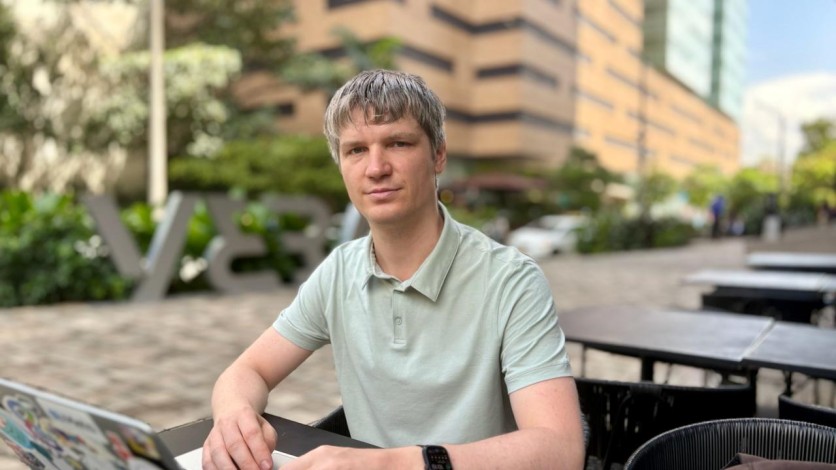
In 2025, getting a job at an international company has become a real challenge: selection algorithms and automated hiring processes have made even the first stages of the interview process more difficult. Hundreds of candidates are screened out at the resume stage, the average number of interview stages has increased, and competition for each vacancy has only intensified. It is especially difficult to get an offer from a FAANG-level company, where the percentage of candidates who pass all stages of the interview process is less than 3%. How can this be achieved? Artem Kuznetsov, a former Senior Software Engineer at Meta, knows the answer. He has worked in Canada, London, and New York, received offers from Google and Meta, and participated in dozens of paid interviews across multiple countries. At Meta, he contributed to projects impacting billions of users worldwide. Today, Artem runs a YouTube channel and Telegram community called Tech Resume Review, where he helps specialists prepare for interviews and adapt their resumes to Big Tech standards. In this interview, the expert shared insights on how to effectively prepare for interviews, whether it's possible to secure a position without referrals at FAANG, how interviews differ for various levels, and whether targeting Big Tech is worthwhile in 2025.
Landing a job at a top tech corporation is far from simple, and yet you received your first international offer when your English was still at a beginner level. How did that happen?
— At that time, my English was basically "school-level." I could read technical documentation, but I had almost no speaking practice. To improve, I watched movies and TV shows in English, switched all my software to English, and did mock interviews online. Eventually, even with an accent, I was able to communicate clearly on technical topics.
The key lesson for me was this: you don't need perfect English. What matters is the ability to get your ideas across. The most important thing is not to be afraid and not to chase perfection. In international companies, interviewers are trained specifically to ensure that language level doesn't influence the assessment of a candidate. Companies like Google and Meta understand this very well: they teach their engineers to evaluate problem-solving skills and technical expertise, not fluency or accent.
Staying on the topic of candidate evaluation, many developers have endless questions about crafting the right résumé. You run the Telegram community Tech Resume Review, where more than 16,000 members help each other prepare CVs for international companies. Would you say the résumé is truly the most important factor when applying to Big Tech, or are there other criteria that matter more?
— For recruiters in big tech, a well-written resume is very important. My first versions were far from the required format, and it was this experience that prompted me to create this community. It is important to understand that resumes first go through ATS systems, automatic selection systems. In a sense, resumes need to be SEO-optimized for these systems with the right keywords in order to pass the initial selection. Specific results, figures, and data about what your work has led to are important—don't just describe your job responsibilities. However, a resume is only the beginning; algorithms are your "entry ticket." They are asked at all levels, and without basic training, it is impossible to pass an interview. My profile is in the top 6% globally on LeetCode, but that alone would not be enough to successfully advance to high positions. System design, scaling, and behavioral sections become decisive factors. Companies value not only technical depth but also the ability to negotiate, because when a project involves hundreds of neighboring teams, communication becomes as important a skill as code.
You had offers from Google and Facebook. Is it possible to get into FAANG companies just by responding to external job postings? Or does it mainly work through personal recommendations and headhunting from other top companies at this level?
— It is possible. I received invitations to interviews at Amazon and Meta without a referral—that's when a current employee of the company recommends a candidate. Of course, recommendations help. A referral allows you to bypass the general flow and get into a smaller stream, which significantly increases your chances of getting an interview, but it is not a prerequisite; you can do without them. The main thing is to have a strong resume with numbers and a clear career trajectory. It is very important to show the specific benefits and results of your work. When a recruiter sees that, for example, an engineer has accelerated the release speed by 10 times or made the system more fault-tolerant, they understand the candidate's real contribution. That is, it is very important to demonstrate how exactly your work has improved business performance, saved resources, or solved critical problems.

How do you build a career path step by step to eventually reach top tech companies? And how do you avoid giving recruiters the impression that you are job-hopping? Is there an optimal amount of time to stay in each role to show growth without getting stuck for too long?
— The main thing here is the logic of career development. Each new role should be a clear step up in scale and responsibility. My path looked like this: I started in outsourcing and product companies, then moved to a Canadian product company, then to Meta in London, and finally to Meta in New York. In each role, I built systems, set specific performance metrics, and passed on the practices I had developed. I believe that the optimal length of time to stay in one position is between one and a half and three years. This is enough time to show measurable results and gain recognition. At FAANG-level companies, the average length of employment is indeed about two years, and recruiters do not perceive this as negative "job hopping" if each transition clearly shows a logical trajectory of professional growth for the specialist.
Speaking of career growth, you received interview invitations in the US, UK, Canada, and the Netherlands. Companies even covered onsite interviews and trips to Singapore, Zurich, and Seattle. What advice would you give on communicating with employers so that they invite you to interviews, cover travel, and even handle relocation?
— To be honest, at the beginning, it is always a numbers game and persistence. Later, it becomes more about professional reputation. I sent out hundreds of resumes, constantly practiced my interview skills, and eventually got invitations for onsite interviews at Google in Zurich, Amazon in Seattle, Indeed in Singapore, and later an offer from Meta. I really enjoyed the practice of doing in-person interviews abroad. Before the pandemic, this was standard. Companies would fly candidates to their offices and fully cover flights and accommodation. During COVID, everything moved online, but now, as hiring standards rise, many companies are bringing back in-person interviews. A lot also depends on company policy. Large corporations are more willing to invest in these expenses because, compared to the total cost of hiring a strong engineer, the travel budget is relatively small. The process usually looks like this: first, you go through several online stages, and then the final round happens onsite. Meta later covered my relocation first to London and then to New York. That shows when a company is truly interested in a candidate, it is willing to invest in bringing them on board.
And one last question: Artem, is it still worth aiming for Big Tech in 2025, and why?
— Absolutely. It means a high salary, a powerful line on your resume, and a unique experience that is valued worldwide. At Meta, I worked on one of the most complex deployment platforms in the industry, supporting Facebook.com, VR/AR applications, and mobile platforms. We built systems that directly shaped the user experience of billions of people and hundreds of teams inside the company. For example, I reduced the application versioning process from 30 minutes down to 2.5 seconds for hundreds of products, and improved the mobile Facebook app build success rate from 62% to 100%. Opportunities to work at that scale rarely exist outside FAANG. It is a rare chance to see your technical decisions affect the daily lives of billions of users. Even if you later move to a startup or launch your own business, that background opens countless doors.
ⓒ 2026 TECHTIMES.com All rights reserved. Do not reproduce without permission.




